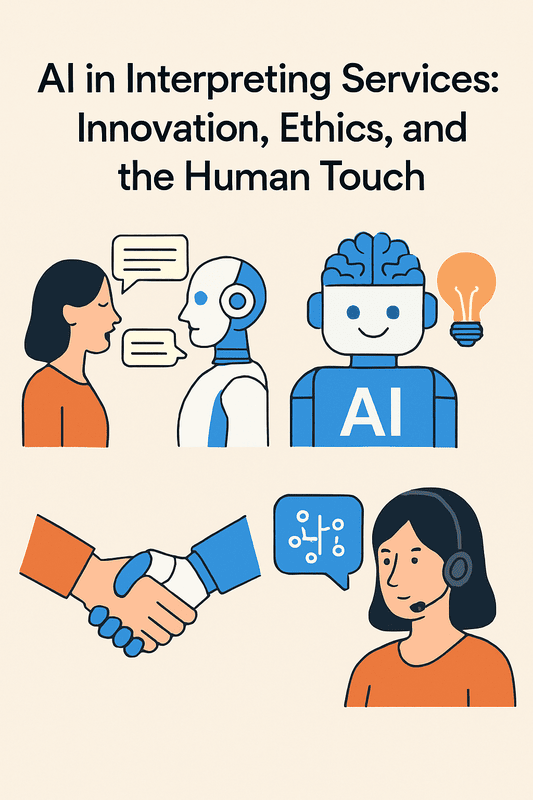
What does the rise of AI in Interpreting Services mean for organizations around the globe?
Artificial Intelligence (AI) is reshaping industries across the globe, and the world of interpreting is no exception. With rapid advancements in Large Language Models (LLMs) and machine interpreting (MI) tools, the conversation is shifting from possibility to implementation. But as this technology progresses, it’s important to examine both the benefits and the limitations of AI in interpreting services, especially when communication stakes are high.
At SpokenHere, we’re closely following this evolving landscape and engaging in thoughtful dialogue about where AI adds value – and where the human element remains non-negotiable.
Efficiency and Access: The Promise of AI-Powered Interpreting
There’s no question that AI-powered language access tools offer compelling advantages in certain settings. In low-risk, high-volume environments – such as call centers or basic customer service support – AI interpreting can dramatically reduce wait times and costs. For organizations operating on tight budgets, the potential for 24/7 availability and immediate language support is hard to ignore.
In remote settings, AI in remote interpreting can be a supplemental resource, providing faster service when human interpreters aren’t immediately available.
Limitations and Risks: When Accuracy and Empathy Matter Most
Despite its promise, AI interpreting is not ready to replace human interpreters – especially in complex, sensitive, or emotionally nuanced situations. In healthcare, legal, or mental health settings, accuracy is vital, and cultural competence, empathy, and the ability to read non-verbal cues can mean the difference between misunderstanding and true understanding.
Unlike humans, AI can’t reliably navigate regional dialects, emotional tone, or cultural taboos. And in critical moments, a misinterpreted phrase could have life-altering consequences.
This is why human-in-the-loop interpreting – a model that combines AI tools with human oversight – has emerged as a preferred middle ground, offering innovation without compromising accuracy or care.
The Ethical Debate: Bias, Privacy, and Professional Impact
The increasing use of AI also brings with it a host of ethical questions:
- How transparent should organizations be about using AI for interpretation?
- Can we guarantee data privacy when machines process sensitive conversations?
- What happens to the livelihoods of professional interpreters?
There is growing concern about bias in AI models, especially when trained on unbalanced or non-inclusive datasets. Moreover, using AI without disclosing it to the individuals involved may violate ethical standards or regulatory requirements—particularly in healthcare or legal interpreting.
SpokenHere believes in ethical innovation. That means exploring emerging tools responsibly, prioritizing transparency, and advocating for guidelines and standards that protect both clients and interpreters.
A Future with Both AI and Humans
The future of interpreting doesn’t have to be a battle between humans and machines. Instead, it can be a partnership.
Human interpreters may leverage AI for terminology lookup, real-time speech-to-text assistance, or background preparation—freeing up more energy for human connection. Organizations can use AI to expand basic access while ensuring qualified interpreters are on hand for critical conversations.
This balanced approach supports the future of interpreting: one where AI enhances rather than replaces the role of professional interpreters.
Staying Thoughtful in a Rapidly Evolving Space
The integration of AI in interpreting services is an ongoing journey. At SpokenHere, we’re committed to staying informed, adaptive, and grounded in ethical practices. We believe innovation should serve people – not replace them – and that language access must always prioritize understanding, dignity, and human connection.
Explore more of our insights on the intersection of technology and language, including our recent blog our perspective on machine translation.
Interested in providing culturally responsive, human-first interpreting services – while embracing the right tech tools?
Contact SpokenHere to learn how we can help your organization navigate language access with integrity.

